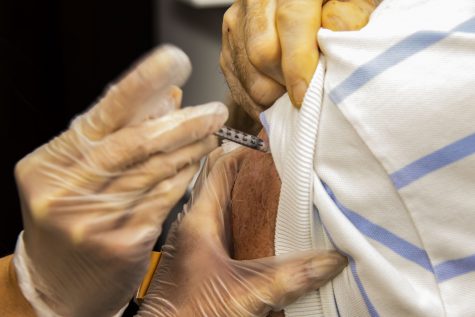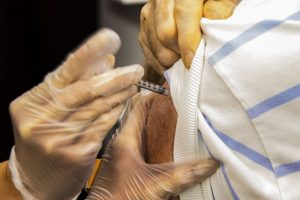UI Hospital and Clinics successfully achieves 10,000 IVF procedures
The Center for Reproductive Care at the University of Iowa Hospital and Clinics established the IVF program in 1978, and now has reached an astonishing number of completed procedures.
Dr. Brad Van Voorhis poses for a portrait at the University of Iowa Center for Advanced Reproductive Care in Iowa City on Thursday, Sept. 30, 2021. (Ayrton Breckenridge/The Daily Iowan)
September 30, 2021
The University of Iowa Hospitals and Clinics has completed 10,000 in vitro fertilization procedures in 30 years.
In vitro fertilization, or IVF, consists of assisting fertility and avoiding genetic issues during the process of conception. Patients may seek IVF if they are unable to conceive without assistance.
The UIHC Center for Reproductive Care established its IVF program in 1978.
Bradley Van Voorhis, director of the hospital’s IVF program, said it has been gratifying to be a part of the program.
“We are seeing multiple changes over time and improved outcomes of higher pregnancy rates and lower multiple birth rates,” Van Voorhis said.
The most recent success rate of IVF performed at UIHC is over 50 percent, exceeding the average 38.6 percent across the nation for women over 35.
Van Voorhis said some patients have difficulty with IVF from being emotionally distraught during the process because it’s difficult for parents to view IVF as a last chance to have a child, even though it isn’t necessarily always true.
“It’s dealing with an emotional rollercoaster of not knowing if you are pregnant or not and the disappointment if you aren’t,” Van Voorhis said. “Sometimes the initial cycle doesn’t work, but we often have cryopreserved or frozen eggs that can be used for a transferred cycle.”
The usual expected time frame for the IVF process for a patient typically lasts about a month, he said. He added the IVF process can be quite expensive and is not always covered by insurance.
Van Voorhis said the demographics of patients that participate in the IVF method are predominantly white, but the program has had an increase in underrepresented minority patients in recent years.
UIHC is one of the estimated 400 clinics that are a member of the Society of Assisted Reproductive Technologies, a measure of high medical standards.
According to the Society of Assisted Reproductive Technologies website, 86 percent of IVF clinics in the U.S. are society affiliated.
The Society of Assisted Reproductive Technologies was founded in 1996, Sean Tipton, chief advocacy and policy officer for the American Society for Reproductive Medicine, wrote in an email to The Daily Iowan.
Some of the technology that is used for the IVF process is transvaginal ultrasound probes, which examine female reproductive organs. Followed by a needle that is inserted into the follicles to obtain the eggs.
Van Voorhis said the center strongly emphasizes the transfer of single embryos for the UIHC IVF program, which has pregnancy rates above the national average.
“We want to help our patients with one healthy pregnancy at a time,” he said.

















